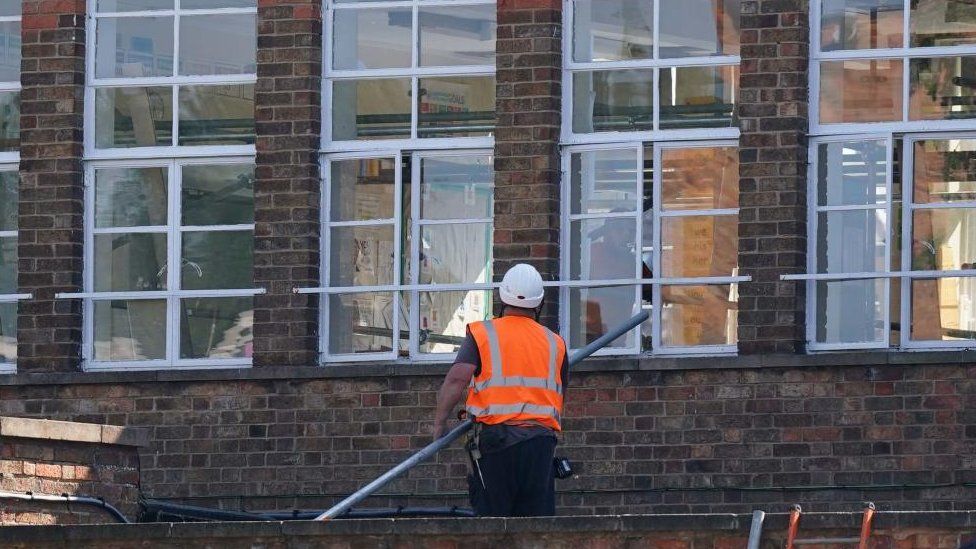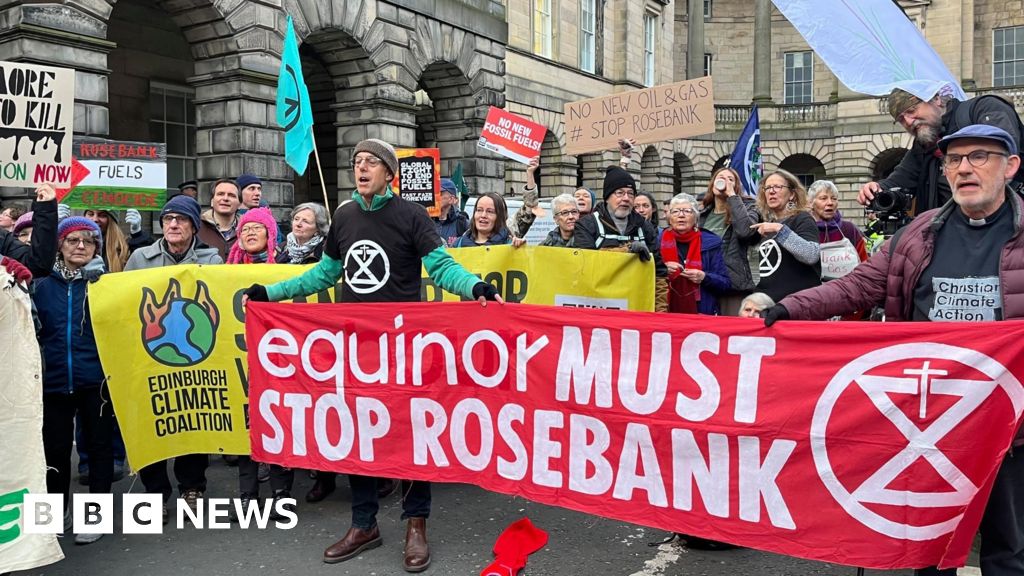ARTICLE AD BOX
 Image source, PA Media
Image source, PA Media
Schools affected by unsafe concrete are battling to secure surveys, while temporary classrooms could take months to build, the BBC has been told.
A governor of a closed school told the BBC none of the engineers suggested by the government were available.
And one firm said building some temporary classrooms could take months.
Schools Minister Nick Gibb said the government was acting to keep children safe in the full or partial closure of some 156 schools in England.
Schools are returning from their summer break this week, but the risk posed by collapse-prone reinforced autoclaved aerated concrete (RAAC) has resulted in full or partial closures and some pupils are learning online.
A list of schools affected by crumbling concrete will be published "before Friday", Mr Gibb said.
Education Secretary Gillian Keegan said on Monday there could be hundreds of schools affected.
Hina Robinson, chair of governors and parent of a child at Wyburns primary school in Rayleigh, Essex, told the BBC that the Department for Education had provided some phone numbers of engineers but none were available for remedial work.
"The focus is on 'how can we get children back into learning in a building of some sort'," Ms Robinson said, adding some children will return to online learning until a space can be found.
She said online learning was "very difficult for the children," but even those who were able to be on site face disruption as "classrooms are set up in places that aren't meant to be classrooms".
Joshua Wedgewood, a student at St Leonards Catholic School in County Durham, is learning online as his school is temporarily closed because of RAAC concrete concerns.
He told BBC Radio 4's Today programme it was like being back in the Covid pandemic, saying: "On a screen it's just not real life, it's isolating, it's being stuck inside your home. It's not nice."
James Saunders, is a head teacher at Honywood School in Essex, where about half of the rooms are unusable due to RAAC.
He told BBC Radio 5 Live that he has explored the option of setting up marquees outside the school as "they're quicker to set up than a mobile classroom".
He said the school will be putting a proportion of its students back onto remote learning using methods employed during Covid.
Schools concrete crisis
The boss of the Wernick Group - which provides portable buildings - told the BBC the current situation was "akin to what happened at the beginning of Covid", when hundreds of test centres were set up around the UK.
David Wernick said: "Clearly emergency action needs to be taken and classrooms are required throughout the UK."
Kieran Webberly, of Wernick, estimated a "simple" temporary building would take "days, a couple of weeks maximum" to construct, but a "bespoke modular" two-storey temporary building would take about six months to build and cost about £1.2m.
Brian Berry, chief executive at the Federation of Master Builders said: "Local builders tend to have full schedules months ahead, so may struggle to cater for the scale of the issue facing schools, like putting up portable classrooms at speed, to ensure children don't miss lessons."
'World-leading response'
Meanwhile, safety consultant, Damini Sharma, said RAAC could be present in more buildings including social housing, courts and hospitals but was potentially difficult to detect because it was often covered.
She told BBC Breakfast that RAAC was was a very lightweight, porous material that was used predominantly from the 50s to the 80s" and "not really suitable for permanent structures".
The information about the lifespan of the material was not available when it was first used, she said.
The head of the spending watchdog, the National Audit Office, accused the government of taking a "sticking plaster approach" to carrying out essential maintenance on school buildings.
Gareth Davies said the "unflashy" job of repairs has been neglected.
But schools minister Mr Gibb said the response to the crisis had been "world-leading".
He told BBC Breakfast that the government was waiting on questionnaires sent to schools to see how prevalent RAAC concrete was.
"We started these questionnaires in March 2022, the vast majority of schools have responded and have not identified RAAC in schools," he said.
"From those surveys we now know that 156 schools have RAAC and in 52 of them we've already taken action, where it was regarded as critical."
Mr Gibb said the government was "proactively seeking more evidence about RAAC" and has discovered more schools containing the material in the process.
He added that had resulted in new guidance where even non-critical RAAC had been taken out of use.
Image source, Reuters
Image caption,Education Secretary Gillian Keegan, arriving to Tuesday's cabinet meeting, apologised for swearing on mic on Monday
The minister added his department bid for 200 school refurbishments a year in 2021 - but the Treasury only funded 50.
"The Treasury has to take into account all the other bids from across Whitehall," he said.
He said that since Rishi Sunak became prime minister an additional £4bn had been allocated in revenue funding for schools in England, which meant £59.6bn will be in the budget next year, a "record amount".
However, Labour leader Sir Keir Starmer said it was "unforgivable" that children were missing the start of term because of potentially unsafe buildings.
"Children are not at school today because of the action the government has failed to take in relation to schools, he said.
"It is a metaphor, frankly, for their sticking plaster politics: never fixing the fundamentals, always sticking plasters."
On Monday, Education Secretary Gillian Keegan apologised after being caught swearing on mic as she expressed frustration at a lack of gratitude for the handling of the school building crisis in England.
She made the comments just after finishing an interview with ITV news while the camera was still filming.
A No 10 source told the BBC those comments by Ms Keegan were "wrong", but in a follow-up interview Ms Keegan apologised for her "choice language".

 1 year ago
32
1 year ago
32








 English (US)
English (US)